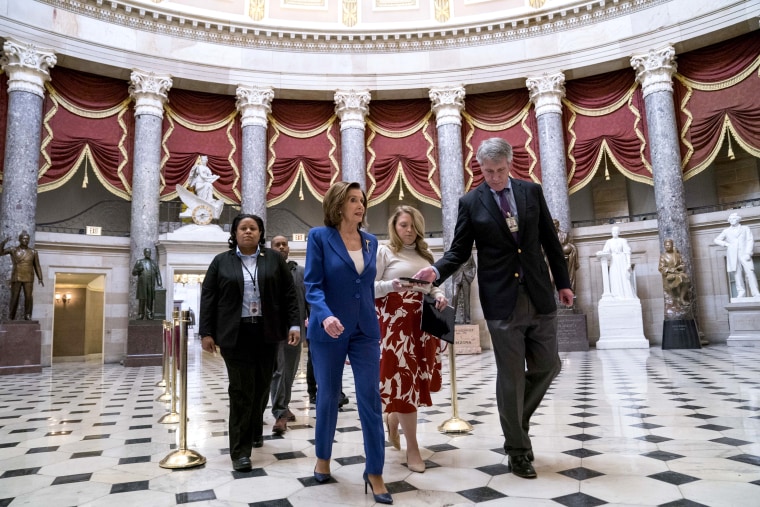The first three economic aid packages, including the $2.2 trillion CARES Act, cleared Congress last month without a whole lot of drama. As the Washington Post reported this morning, the next round is proving to be quite a bit trickier.
A clash loomed in the Senate Thursday morning over competing proposals for coronavirus relief, with Republicans and the White House demanding an additional $250 billion for small businesses, and Democrats insisting on new money for hospitals, cities and states. Both plans were likely to fail, leaving the path forward for additional federal intervention uncertain as the virus continues to tear through the economy.
The dispute is relatively straightforward. The Paycheck Protection Program in the CARES Act is proving to be wildly popular with small businesses -- to the point that the Treasury Department quickly realized that the $349 billion appropriated for the initiative simply isn't enough. Treasury Secretary Steven Mnuchin this week formally asked Congress to add $250 billion to the program.
Broadly speaking, that's an easy lift: both parties are on board with the program and the funding request. With this in mind, Senate Majority Leader Mitch McConnell (R-Ky.) said he'd bring a narrow measure to the floor today, passing the new funding during a pro-forma session, even though Congress isn't scheduled to return to work in earnest until April 20.
But Democratic leaders have endorsed a rival plan they're calling "Small Business Plus." House Speaker Nancy Pelosi (D-Calif.) and Senate Majority Leader Chuck Schumer (D-N.Y.) unveiled a blueprint yesterday for an emergency package that would give the administration the $250 billion for the Paycheck Protection Program, but they want the same bill to include an additional $100 billion for hospitals, community health centers, and health systems; an additional $150 billion for aid to cash-strapped states and local governments; and a 15% increase in SNAP food-stamp benefits.
According to the Democratic leaders' plan, once this package passes -- preferably by tomorrow -- federal policymakers would be able to move forward with talks on a sequel to the $2.2 trillion CARES Act. (Pelosi is calling it "CARES 2.")
For reasons that aren't altogether clear, Republican leaders have balked at the Democratic alternative. At least as of earlier this morning, GOP officials want this week's bill to reinfuse the Paycheck Protection Program, but nothing else. The additional funding for hospitals and states, they've said, can wait for the next round of negotiations.
For her part, Pelosi has called for Republican leaders to come to the table for talks, but that hasn't yet happened.
So, what happens now? Both bills -- McConnell's narrow plan and Schumer's "Small Business Plus" -- are likely to reach the Senate floor today, both of which will fail. At that point, no one's sure what'll happen, though everyone involved should be highly motivated to work something out.
If they do, the bill will go to the House, where Rep. Thomas Massie (R-Ky.) has -- you guessed it -- already raised the prospect of delaying the process. Watch this space.
Postscript: Though it may seem like a peripheral issue, there's considerable talk in Democratic circles about tying the next bill related to the coronavirus to a federal vote-by-mail initiative. GOP leaders, of course, are strongly opposed to the idea, but many Democrats believe it must be a top priority, in part in the interest of public safety, and in part to ensure fair elections in the fall.
As I understand it, Schumer and Pelosi don't intend to press the issue in this week's bill, though it's likely to be a priority in the next bill.
Update: As expected, McConnell tried to advance his narrow bill this morning. And as expected, he failed. Schumer's alternative fared no better.
For context, let's not forget that McConnell tried something similar with the CARES Act last month -- trying to pass a bill without negotiating with Democrats -- and when that didn't work out, bipartisan talks soon followed. Recent history may very well repeat itself.
The Senate's next pro-forma session is on Monday, which should give the relevant players time to work on an agreement, if they're amenable.
